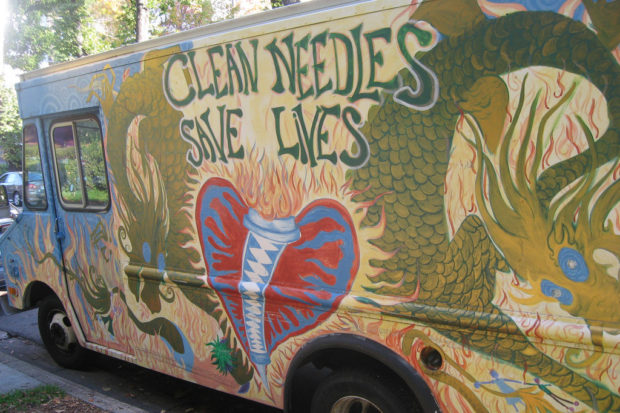
By Catherine Campbell
The Needle Exchange has been ongoing in Fresno for almost two decades, providing clean needles to drug users to prevent the spread of numerous diseases. Hepatitis C and HIV are the more serious of the many. All of these diseases can be passed in other ways, through rough sexual contact, amateur tattooing, blood transfusions or any form of blood sharing. Through these means, the many risks of dirty needles are spread widely to non-drug users.
Nineteen percent of AIDS cases in the state are caused by the sharing of dirty needles, and 750 HIV infections resulting from needle sharing occur annually. Dr. Edward Moreno, Fresno’s health officer, declared a health crisis among intravenous drug users in 2006. If the situation has improved since, it is largely because of the volunteers who work every Saturday at the Needle Exchange, handing out clean needles to drug users who line up by the hundreds.
The provision of clean needles is technically illegal unless the supervising municipality, here the County of Fresno, votes to allow the distribution of clean needles. Three years ago, the Board of Supervisors—persuaded by health experts—voted to allow the Needle Exchange to continue its work with its permissive imprimatur.
With this sanction, the Needle Exchange volunteers, including Dr. Marc Lasher, who provides free medical care during the Exchange hours, planned to expand and team up with Westcare, a respected drug-treatment provider, to offer drug users an opportunity to sober up. This plan also included the enlarged provision of healthcare at the site, hoping to keep drug users and the poor generally out of local emergency rooms. The provision of mental health services was also part of the package, something sorely needed since the Board has done what it can to make it impossible for the mentally ill to find help in this county.
A majority of the members of the Board of Supervisors is apparently indifferent to the dangers of dirty needles to drug users and the rest of us. Judy Case, Phil Larson and Debbie Poochigian voted in late August against allowing the Exchange to continue with legal cover from the Board, calling the provision of clean needles “enabling” to drug users. The plan to expand the services available at the Needle Exchange died in their hands. Those whose illnesses resulted from accidental blood sharing, as well as drug use, were tossed to the side of the road in this reactionary and ignorant call.
Judy Case and Debbie Poochigian did not respond to email requests for interviews about their votes.
Public health experts responded to the Board’s vote with disdain and contempt. Taxpayers should feel the same since they will ultimately pay for the healthcare of people ill because of dirty needles, either through their insurance plans or through county dollars. Bill McEwen of the Fresno Bee wrote one of his best columns on the subject and, in a subsequent e-mail exchange, agreed that the Board’s vote showed an unadorned lack of compassion.
Calling the provision of clean needles “enabling” of illegal conduct is very much like calling farming “enabling” of illegal immigration, which, of course, it is. Citizens outraged at the existence of undocumented Mexicans in our midst should call on the Board to outlaw farming while on this moral crusade. Of course, the Board would also have to outlaw hiring the undocumented to mow our lawns, clean our homes and care for our children. Narrow moralistic policing could lead us in all sorts of creative new directions. And if we leave people sick, poor, delusional and unemployed, so be it.
Let us not forget that most drug addicts are not the people who line up at the Needle Exchange. They are the American middle- and upper-class who live in the better neighborhoods, probably the same neighborhoods inhabited by the Board’s majority. They are addicted to Vicodin, codeine, nicotine, Percodan, Percocet, cough medicines, Xanax, Ativan, Valium, Librium, Norco, OxyContin, Ambien, alcohol and a multiplicity of other drugs lawfully prescribed by their “enabling” physicians or sold at a market. If the Board doesn’t want to “enable” drug addiction, it should ban prescribing physicians, pharmacies and grocery stores, as soon as it’s done banning farmers.
Of course, this is ridiculous. But it does highlight the absurdity of the Board’s position and the “war on drugs” generally. The history of our federal and state bans on certain drugs, addictive and not-so-much, has been aimed at the poor and racial minorities. Thus, marijuana was banned not because it was addictive, dangerous or even a “gateway drug.” It was first heavily taxed in 1937 and then banned in 1951 because it was enjoyed by Mexicans and jazz musicians. And, so it went.
Now we have irrational class distinctions between legal and illegal drugs depending on who uses them, not their inherent qualities. That’s the reality of the drug laws, and here is our Board of Supervisors continuing a class war that only divides us. And all under the guise of saving us from ourselves.
The majority Board members should emerge from their stone-age caves and come to their senses. Medical marijuana dispensaries cause no more disruption to a neighborhood than a corner liquor store. The Needle Exchange provides a valuable service to people who need help and who share our common humanity.
*****
Catherine Campbell is a semi-retired civil rights attorney.
